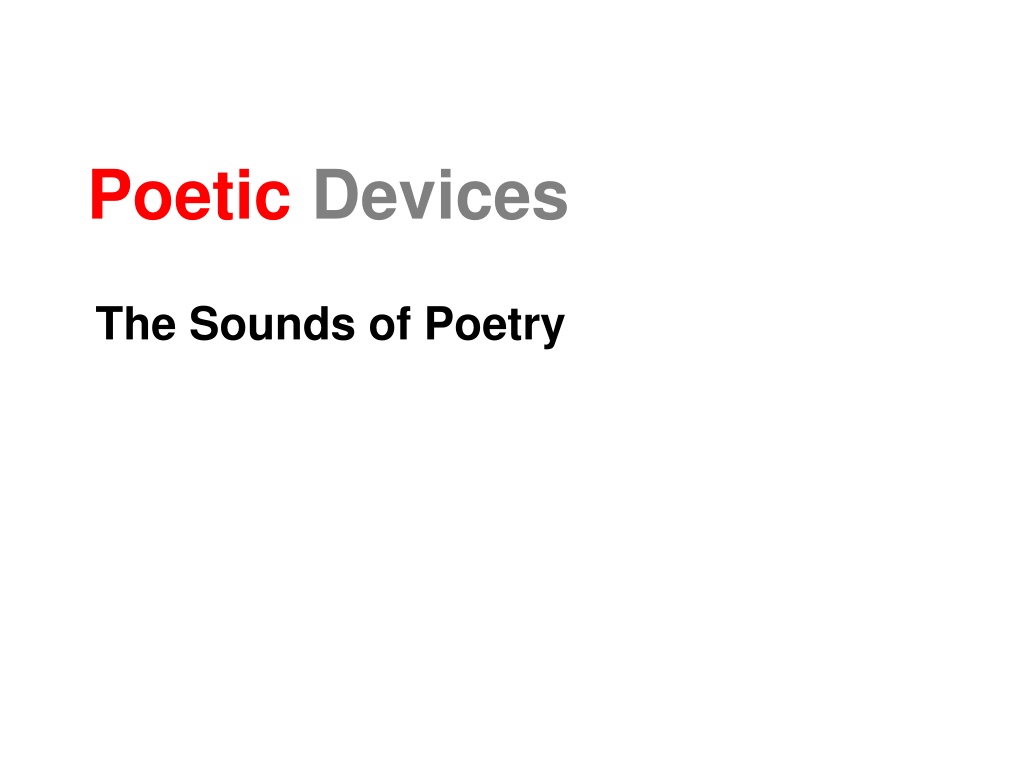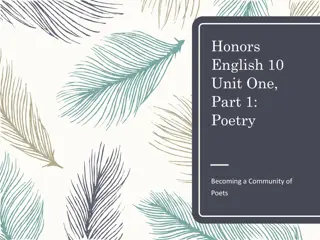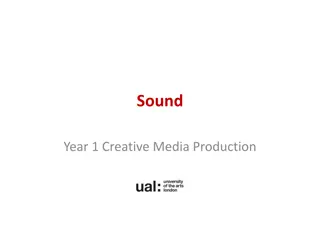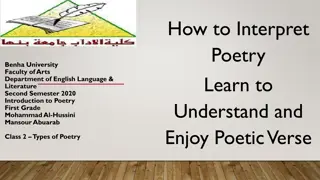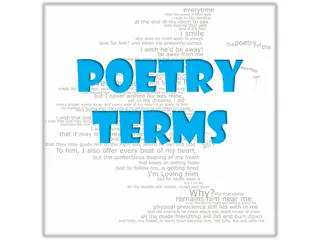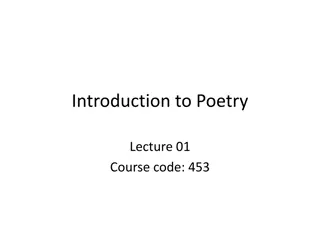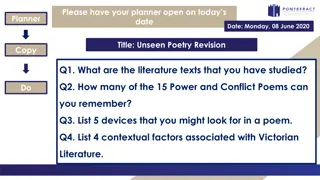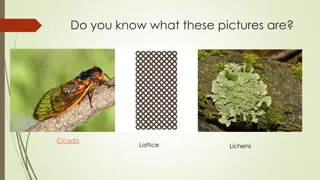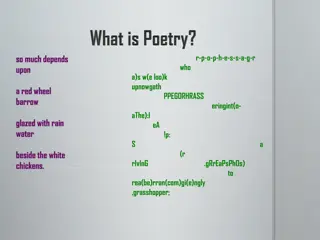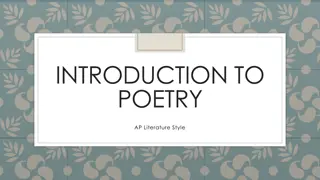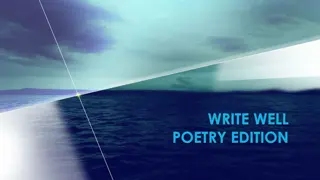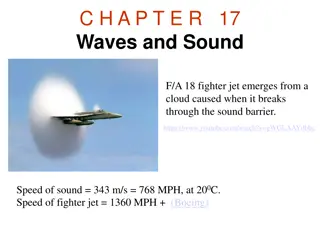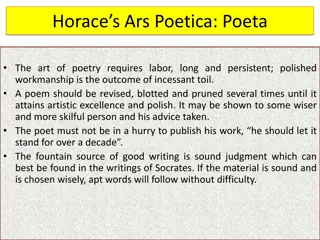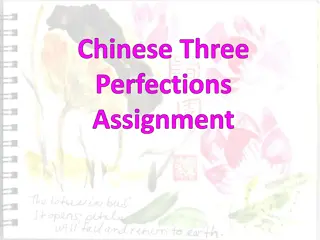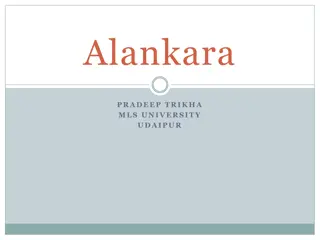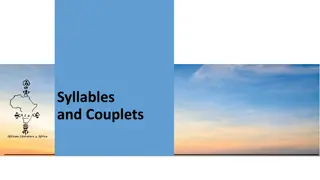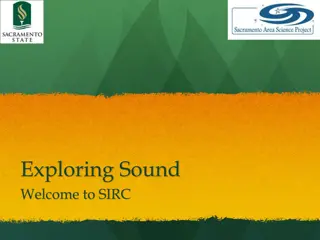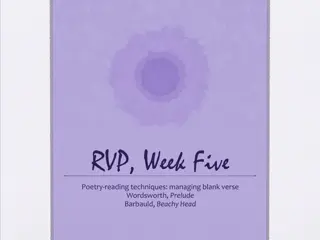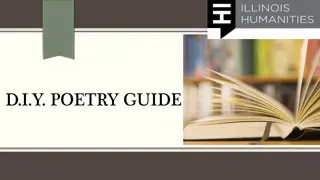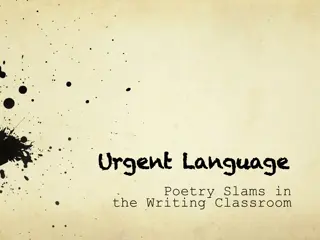Exploring Poetic Devices and Sound in Poetry
Explore the sounds of poetry through various poetic devices such as onomatopoeia, repetition, meter, rhyme, alliteration, consonance, and assonance. Dive into examples and visual representations to understand how these techniques enhance the beauty and rhythm of poetic compositions. Test your knowledge with a practice quiz at the end.
Download Presentation

Please find below an Image/Link to download the presentation.
The content on the website is provided AS IS for your information and personal use only. It may not be sold, licensed, or shared on other websites without obtaining consent from the author. Download presentation by click this link. If you encounter any issues during the download, it is possible that the publisher has removed the file from their server.
E N D
Presentation Transcript
Poetic Devices The Sounds of Poetry
Onomatopoeia When a word s pronunciation imitates its sound. Examples Buzz Hiss Beep Fizz Clink Vroom Woof Boom Zip
Repetition Repeating a word or words for effect. Example When you, my Dear, are away, away, How wearily goes the creeping day.
Meter A poem s rhythmic pattern, mainly determined by the strong and weak stresses a reader naturally places on the words. Example: There once was a girl from Chicago Who dyed her hair pink in the bathtub I own a solace shut within my heart, A garden full of many a quaint delight Hint: hum the words instead of saying them.
Rhyme Repetition of sounds at the ends of words (also called end rhyme or external rhyme) Internal Rhyme: occurs within a single line Examples His red sports car is just a dream. It needs no gas, it runs on steam. The children like the ocean shore. We want to leave but they want more.
Alliteration Repetition of initial consonant sounds. Example He climbs the hill and huffs and heaves. Slim-pinioned swallows sweep and pass.
Consonance The repetition of consonant sounds in stressed syllables with different vowel sounds. Creates a near rhyme sound Examples Gulls Gracefully pass across the sky. Fish in a mesh net.
Assonance The repetition of vowel sounds in stressed syllables that do not rhyme. Calling and squawking like crows, they fought. -The repetition of the aw sound reinforces the sense of the simile.
Practice Quiz I ll put some lines of poetry on the board. Write down which techniques are used: Alliteration, consonance, meter, rhyme, and onomatopoeia. Some poems use more than one technique.
1 Oh! To be a wave Splintering on the sand, Drawing back, but leaving Lingeringly the land.
Answers Meter Rhyme Consonance Alliteration
1 Oh! To be a wave Splintering on the sand, Drawing back, but leaving Lingeringly the land.
2 Drip--hiss--drip--hiss fall the raindrops on the oaken log which burns, and steams, and smokes the ceiling beams. Drip--hiss--the rain never stops.
Answers Onomatopoeia Consonance Repetition Rhyme
2 Drip--hiss--drip--hiss fall the raindrops on the oaken log which burns, and steams, and smokes the ceiling beams. Drip--hiss--the rain never stops.
3 A trumpet-vine covered an arbour With the red and gold of its blossoms. Red and gold like the brass notes of Trumpets.
Answers Alliteration consonance repetition
3 A trumpet-vine covered an arbour With the red and gold of its blossoms. Red and gold like the brass notes of Trumpets.
4 I passed through the gates of the city, The streets were strange and still, Through the doors of the open churches The organs were moaning shrill.
Answers Meter Rhyme Alliteration
4 I passed through the gates of the city, The streets were strange and still, Through the doors of the open churches The organs were moaning shrill.
5 Upon the enchanted ladder of his rhymes, Round after round and patiently The poet ever upward climbs.
Answers Repetition Rhyme Light Alliteration
5 Upon the enchanted ladder of his rhymes, Round after round and patiently The poet ever upward climbs.
